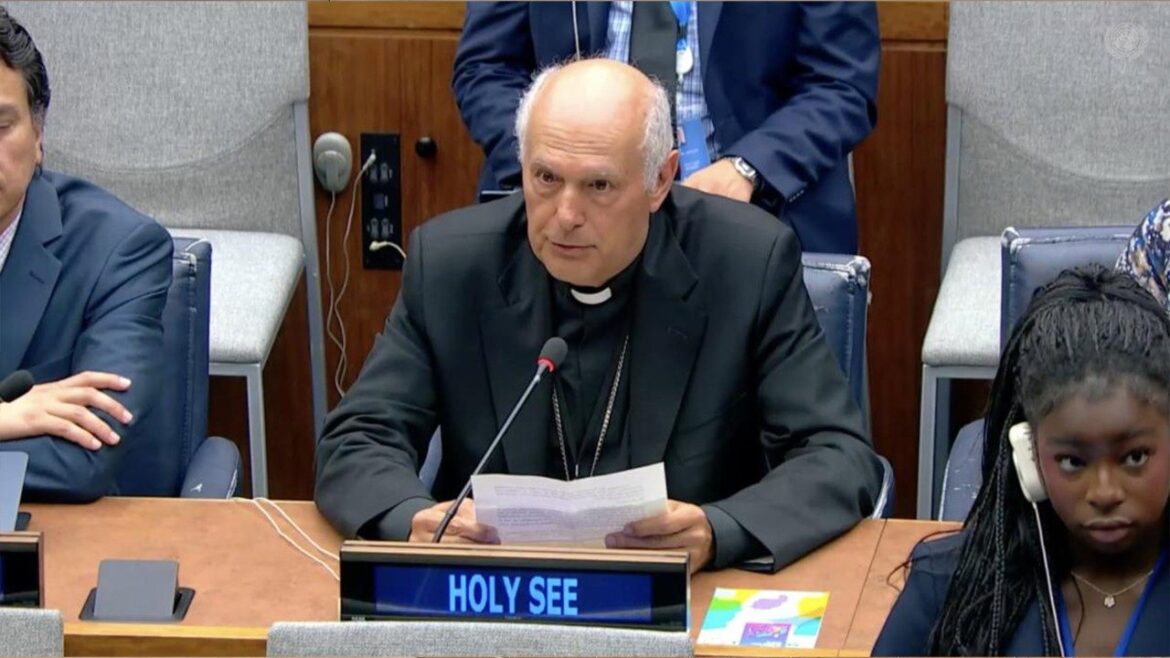
Archbishop Gabriele Caccia, the Permanent Observer of the Holy See to the United Nations, addresses the UN’s ‘Second Committee Debate on Item 18: Sustainable Development,’ and insists that ecological debt owed to developing countries must be rectified, biodiversity be protected, and there must be greater education for integral ecology.
By Deborah Castellano Lubov
Archbishop Gabriele Caccia, the Permanent Observer of the Holy See to the United Nations, addressed the UN on 13 October in New York during the Second Committee Debate on “Item 18: Sustainable Development.”
In his address, the Permanent Observer called for education, concrete action, and a transformation of mentalities to protect the environment.
Renewed and courageous call to action
“The Holy See is a staunch promoter of integral human development, with a vision that encompasses the full development of every person,” Archbishop Caccia stated. “At this critical juncture, marked by overlapping crises of poverty, climate change and conflict, a commitment to integral human development is more vital than ever.”
He recalled that 2025 will mark the tenth anniversary of Pope Francis’s encyclical Laudato Si’, a document he described as “prophetic in its highlighting of the interconnectedness of people and the planet.” He also referenced Pope Leo XIV, noting how he likewise expressed concern for climate change and environmental degradation, reaffirming how its dramatic effects disproportionately impact the poor and indigenous communities.
The Apostolic Nuncio stressed that when human dignity and the integrity of creation are subordinated to short-term interests and gains—when “nature is used as a bargaining chip”—this “distorts the meaning of sustainable development.”
In response, the Permanent Observer called for “a renewed and courageous call to action,” which he said could be achieved through three concrete approaches.
Rectifying ecological debt
Firstly, Archbishop Caccia emphasized that the “ecological debt” owed to developing countries must be rectified.
The Holy See, he recalled, has consistently stressed the moral and ethical dimensions of this ecological debt, which he defined as “commercial imbalances with effects on the environment, and the disproportionate use of natural resources by certain countries over long periods of time.”
“The nations and sectors that have disproportionately contributed to environmental degradation and climate change,” he stated, “bear the responsibility to support those most affected by its consequences.”
He added that rectifying this ecological debt requires developed countries to significantly reduce their consumption of non-renewable energy and to assist poorer nations in supporting sustainable development. This assistance could include adequate financing, debt relief in times of crisis, the sharing of appropriate technologies, and capacity building.
Such measures, he said, would not only help repay the ecological debt but also support developing nations on their path to sustainability.
Concerted action to protect biodiversity
Secondly, Archbishop Caccia stressed the need for concerted action to protect biodiversity.
He called ambitious action to preserve biodiversity “a moral duty of stewardship” undertaken not only for the present but also for future generations.
“Protecting our forests, oceans and ecosystems,” he noted, “is essential, both as a sign of their intrinsic value and for the survival of the countless communities whose livelihoods depend on them.”
He warned that the rapid loss of species, habitat destruction, and pollution are more than ecological concerns—they have deep, human consequences.
Promoting education for integral ecology
Thirdly, the Permanent Observer called for greater promotion of education for integral ecology.
“Lasting change cannot be achieved through policies alone,” he said. It also requires “a conversion of hearts and minds,” especially through lifestyle changes fostered by education that “informs choices, inspires solidarity and equips young people to build a culture of sustainability.”
He emphasized that educational initiatives should go beyond technical solutions and include ethical formation to cultivate a shared responsibility for protecting creation.
In conclusion, Archbishop Caccia stated that by “promoting ecological education, we can nurture a new way of living, one that respects both the dignity of the human person and the integrity of creation.”

